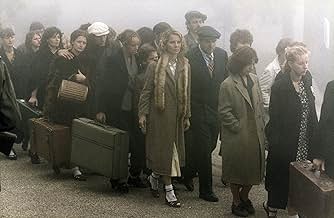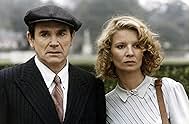VALUTAZIONE IMDb
7,3/10
2942
LA TUA VALUTAZIONE
Attraverso una musica favolosa, ripercorre tre generazioni di musicisti e ballerini provenienti da Russia, Germania, Francia e Stati Uniti, da prima della Seconda Guerra Mondiale, attraverso... Leggi tuttoAttraverso una musica favolosa, ripercorre tre generazioni di musicisti e ballerini provenienti da Russia, Germania, Francia e Stati Uniti, da prima della Seconda Guerra Mondiale, attraverso la guerra e l'Olocausto, fino agli anni Ottanta.Attraverso una musica favolosa, ripercorre tre generazioni di musicisti e ballerini provenienti da Russia, Germania, Francia e Stati Uniti, da prima della Seconda Guerra Mondiale, attraverso la guerra e l'Olocausto, fino agli anni Ottanta.
- Premi
- 1 vittoria e 6 candidature totali
Recensioni in evidenza
I happened to be in Paris when this film was released. I was able to see it three times in 2 weeks at a theater who did English Subtitles. What an incredible movie. Unfortunately, it was released within months of Blake Edwards "10" which also used "Bolero" as it's main theme and that movie went over big time in the US, so distributors had a problem getting this film out. I wish they would re-release it. The thing I enjoy the most about it is the director's multiple uses of the actors. Many play their characters children and grandchildren. It is also an incredible look at a time when the world was trying to blow each other up and it shows that people everywhere just want the same things. A brilliant film.
Just viewed this movie on a DVD from Netflix. This movie is what a motion picture can be in the hands of an intelligent and talented director.
The photography was wonderful, the use of color was spectacular, the sound was excellent, and the music and performances were top notch. I especially liked the full symphony orchestra segments and the American big band segments. The Folies-type musical numbers were also done with flair, and Geraldine Chaplin proved herself to be a classy cabaret singer (assuming her voice wasn't dubbed). Michel Legrand I believe was responsible for the music, which was first rate throughout.
All production values were of the highest order.
The final dance sequence, which lasted far longer than anything Hollywood would permit, was phenomenal; the late Jorge Donn was not Nureyev, but spectacular all the same. The robustness and uncompromisingly balletic style of the finale put the ballet sequences in a couple of American movies--American In Paris and Carousel-- in the shade.
Released in the U.S. as Bolero, apparently. Without car chases, explosions, etc., I doubt if it did very well at the box office over here.
The photography was wonderful, the use of color was spectacular, the sound was excellent, and the music and performances were top notch. I especially liked the full symphony orchestra segments and the American big band segments. The Folies-type musical numbers were also done with flair, and Geraldine Chaplin proved herself to be a classy cabaret singer (assuming her voice wasn't dubbed). Michel Legrand I believe was responsible for the music, which was first rate throughout.
All production values were of the highest order.
The final dance sequence, which lasted far longer than anything Hollywood would permit, was phenomenal; the late Jorge Donn was not Nureyev, but spectacular all the same. The robustness and uncompromisingly balletic style of the finale put the ballet sequences in a couple of American movies--American In Paris and Carousel-- in the shade.
Released in the U.S. as Bolero, apparently. Without car chases, explosions, etc., I doubt if it did very well at the box office over here.
Along three generations, the lives of different families in Russia, France, Germany and United States of America, all of them connected to music and dance, are affected by the World War II. In Russia, the Bolshoi ballerina Tatiana Itovitch (Rita Poelvoorde) loses her husband, the musician Boris Itovitch (Jorge Donn), in the Russian front. She raises alone their son, the professional dancer Sergei (Jorge Donn), who escapes from Soviet Union and coming to have a daughter, the also ballerina Tania. In France, the Jewish violinist Anne Meyer (Nicole Garcia) marries the pianist Simon Meyer (Robert Hossein), and both are sent to a concentration camp, where Simon dies. On the train travel to the camp, Simon leaves their baby son on the trails and he is raised by a priest, becoming the lawyer Robert Prat (Robert Hossein), who has a professional singer son. Also in France, in Paris after the war, the singer Evelyne (Evelyne Bouix) is accused of sleeping with the enemy, and moves to Dijon, where she has a daughter, Edith (Evelyne Bouix). In Germany, the pianist and conductor Karl Kremer (Daniel Olbrychski) leaves his wife Magda Kremer (Macha Méril) and their son to fight in the war. In USA, the famous pop singer Jack Glenn (James Caan) leaves his wife Suzan Glenn (Geraldine Chaplin) to join the army and entertain the troops in London. Their gay son Jason Glenn (James Caan) and daughter, the singer Sara Glenn (Geraldine Chaplin) become important persons in the show business. Their lives are entwined in a Red Cross presentation of the Ravel's Bolero in Paris.
"Les Uns et les Autres" is the masterpiece of Claude Lelouch and is one of my favorite movies ever. First time I saw it I was amazed with such a magnificent story. The direction, the story, the cast, the soundtrack, the location, everything works perfectly in this overwhelming film. The long scenes are fantastically well filmed and Claude Lelouch was certainly inspired when he made this wonder. Only a couple of months ago, this DVD was released in Brazil by the Brazilian distributor "Classicline" and yesterday I saw it again, for my delight after twenty and something years. The unknown Sharon Stone has a minor uncredited participation in the end of the movie, watching the show on TV in bed with Jack Glenn. "Les Uns et les Autres" is a highly recommended movie, for lovers of arts and cinema. My vote is ten.
Title (Brazil): "Retratos da Vida" ("Pictures of the Life")
Note: On 10 February 2014, I saw this wonderful movie again.
"Les Uns et les Autres" is the masterpiece of Claude Lelouch and is one of my favorite movies ever. First time I saw it I was amazed with such a magnificent story. The direction, the story, the cast, the soundtrack, the location, everything works perfectly in this overwhelming film. The long scenes are fantastically well filmed and Claude Lelouch was certainly inspired when he made this wonder. Only a couple of months ago, this DVD was released in Brazil by the Brazilian distributor "Classicline" and yesterday I saw it again, for my delight after twenty and something years. The unknown Sharon Stone has a minor uncredited participation in the end of the movie, watching the show on TV in bed with Jack Glenn. "Les Uns et les Autres" is a highly recommended movie, for lovers of arts and cinema. My vote is ten.
Title (Brazil): "Retratos da Vida" ("Pictures of the Life")
Note: On 10 February 2014, I saw this wonderful movie again.
10Guy33134
Well, I'm obviously not alone in saying this is the best, the greatest, the finest movie, etc. So what's with the rating? Again, as in many cases of movies with few votes, a small group skews the score to a ridiculous level. I saw this masterpiece in Paris when it came out in the early 1980's, and went back to see it the nest day. It was too much exquisite detail to take in during one sole session. The development of the characters, interwoven into the fabric of tragedy that was the war, the haunting Bolero by Ravel. Devastingly beautiful touching, and grand. Since this film, Lelouche (A MAN AND A WOMAN, LES MISERABLES (1994) has made a few films touching on his autobiographical experiences as a young Jew, during the Holocaust. This movie was made before there were dozens of them to compare to, like Lelouche's own perhaps just as good LES MIS... with Jean-Paul Belmondo. Having lived in France, I know there are many cinephiles who just outright hate Lelouche. These feelings, as I have experienced them, are thinly-veiled anti-semitic feelings. Say, it may be an "artsy" way of saying I'm an anti-semite: J'aime pas Lelouche. I think this is why this movie is undeservedly ranked so low in this base. I came across, and voted on it a while back, precisely because the rating shocked me so. As I went through the comments though today, I was happy to see I was not alone, and thought I would throw my "ten francs worth" in. I want to buy it for my collection.
10ericibe
I may not remember everything, but this film has been on my mind since I saw it 23 years ago. I was in high school in a small town in Iowa. One of our band directors had a large collection of film on tape and laser disc. He would have movie parties for kids he taught. I showed an interest in film and he would screen some films I would have otherwise never have seen. I remember watching Bolero. (I do not think I knew it was known by any other name) I was in absolute awe of this film. The music, the story, the pacing - everything you couldn't get from popular American films.
I have avoided seeing it again in the intervening time because I did not want my more grown up sensibilities to have a different opinion of the film. After reading some of the comments here I can feel safe to view it again.
I have avoided seeing it again in the intervening time because I did not want my more grown up sensibilities to have a different opinion of the film. After reading some of the comments here I can feel safe to view it again.
Lo sapevi?
- QuizFrancis Lai: The composer appears as the blind accordion player.
- Blooper(at around 1h 21 mins) The soldiers are playing cards on the train and the game they are playing changes between shots.
- Curiosità sui creditiThe grand majority of the opening credits are spoken by the narrator. The narrator stops after crediting the choreographer. Only the film's production company, title and the name Claude Lelouch appear in writing before the Bolero dance at the opening (when the writing is onscreen, the orchestra is warming up). Also, a quote by Willa Cather appears at the very beginning.
- Versioni alternativePresented on French television in a 6 hours version quite clearer then the shortened American release. Richard Bohringer and Fanny Ardant's characters, for example, are better developed.
- ConnessioniEdited into Les uns et les autres (1981)
- Colonne sonoreFolies Bergère
Music by Francis Lai
Lyrics by Boris Bergman
Performed by Catherine Russell and Ginette Garcin
I più visti
Accedi per valutare e creare un elenco di titoli salvati per ottenere consigli personalizzati
- How long is Bolero?Powered by Alexa
Dettagli
- Data di uscita
- Paese di origine
- Siti ufficiali
- Lingue
- Celebre anche come
- Bolero: Dance of Life
- Luoghi delle riprese
- Garancières, Yvelines, Francia(Railway crossing and station scene)
- Aziende produttrici
- Vedi altri crediti dell’azienda su IMDbPro
- Tempo di esecuzione
- 3h 4min(184 min)
- Colore
- Proporzioni
- 2.35 : 1
Contribuisci a questa pagina
Suggerisci una modifica o aggiungi i contenuti mancanti
































